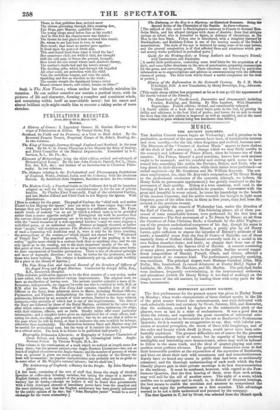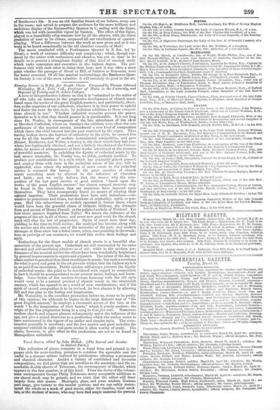THE BEETHOVEN QUARTET SOCIETY.
The first performance for the present season was given in Harley Street on Monday; when works characteristic of three distinct epochs in the life of the great master formed the entertainment, and were delivered with such admirable truth and certainty by Sivori, Saintoni Hill, and Rousselot, that the audience, excited by degrees to the enthusiastic pitch of the players, were at last in a state of enchantment. It was a good idea to direct the talents, and especially the great execution of celebrated solo- players, into a channel so favourable to the art as Beethoven's Posthumous Quartets; for it is scarcely an exaggeration to say, that, with inferior exe- cution or musical perception' the secret of these wild imaginings, and of the order and beauty which dwell in them, could never have been satis- factorily explained. The greatest difficulties are of course for the pioneers in this extraordinary style of music; but its capacity of being rendered. intelligible and interesting once demonstrated, others may well be induced to follow in the same track, and the ideal of quartet-playing and com- position must perforce advance. The performers themselves seem to feel their honourable position as the expounders of the mysteries of Beethoven, and have set about their task with uncommon zeal and conscientiousness. Rarely have we heard any music in public that had been so assiduously rehearsed; and the thorough understanding of each work which the four friendly players gain in their private meetings is its best recommendation to the auditory. It must be confessed, however, with regard to the Post- humous Quartets, that the first hearing of them, even from such artists, may well call for the aid of another sense. The sight of a score, which enables one to anticipate and to recall, is, in default of frequent hearings, the best means to enable the musician and amateur to comprehend the design and enjoy the performance on a first occasion. This advantage seemed to be not a little understood and pursued by the company.
The first Quartet in F, led by Sivori, was selected from the Mozart epoch of Beethoven's life. It was an old familiar friend of, we believe, every one in the room; and served to prepare the audience for the more brilliant and ambitious display of the Rasumoffsky Quartet in C, ending with the fugue, which was led with incredible vigour by Sainton. The effect of this fugue, played in a beautifully crisp staccato bow by all the players, with the finest gradation of tone to its climax, surpassed all our recollections of quartet- playing. What a difference between the work as now given and as it was wont to be heard occasionally in the old chamber concerts of Mori!
The music concluded with a Posthumous Quartet in E fiat, led by Sivori; a work of extreme difficulty and complexity; which, though ren- dered by the artists with enthusiasm and abandon, was yet so clear in its details as to present a triumphant display of that kind of musical study which tasks conception and execution in the highest degree. The per- formers vied with each other in doing their best; and it was often a moot point whether the passages of Sivori or Hill, of Sainton or Rousselot, were the better executed. Of all late musical undertakings, the Beethoven Quar- tet Society is one of the most valuable: it will certainly do good to the art.



























 Previous page
Previous page